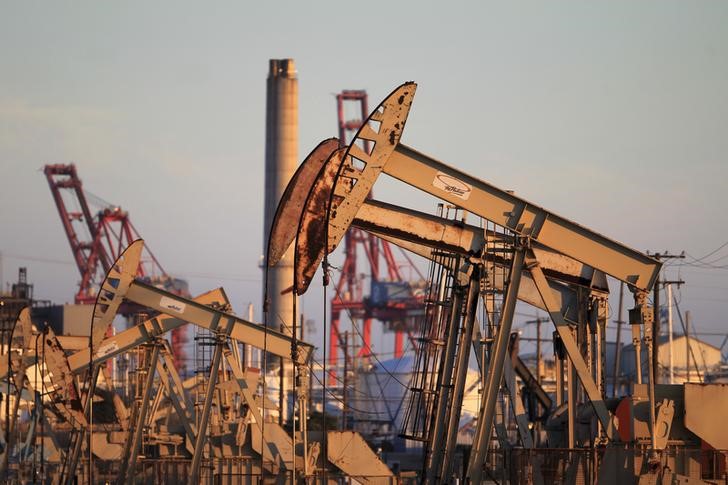By Seng Li Peng, Ron Bousso and Ahmad Ghaddar
LONDON/SINGAPORE (Reuters) - Refineries that usually rejoice at falls in the price of crude as a way to boost profits are instead contemplating extensive maintenance and slowing their output as travel restrictions in response to the coronavirus pandemic destroy demand.
In Asia, margins for producing transport fuels plunged to multi-year or multi-month lows this week after more countries imposed international travel restrictions and curbed domestic movement as part of measures to slow the spread of the new coronavirus.
Airlines and airports are facing a huge shock as they battle a cash crunch, while gasoline demand in the United States, the world's largest oil consumer, is plunging as state and local governments advise people to stay at home and businesses to shut. Asian refiners may have to cut jet fuel production.
In Europe refiners are losing nearly $7 on every barrel of gasoline they produce, a figure not seen for 11 years. While differentials for jet fuel cargoes fell to a record low because of the lack of demand. [PRO/E]
Asian refiners are producing gasoline at a loss of 78 cents a barrel of Brent crude, their worst loss in 13 months.
U.S. gasoline refining margins fell a whopping 95% on Monday - briefly turning negative - to settle at 28 cents per barrel, their lowest since December 2008.
Asian refining margins, or cracks, for jet fuel plunged to $4.71 per barrel over Dubai crude, the lowest on record for Refinitiv data going back to March 2009. They were at $7.70 on Friday.
"When crude prices fell heavily early last week, it gave an incentive to refineries to keep runs unchanged. Eventually, with the virus-related situation developing, it's now the second time for global refineries to think of run cuts," a Seoul-based middle distillates trader said.
Brent crude is trading at a four-year low of just below $30/bb.
Traders, all speaking on condition of anonymity, said it was extremely difficult for refiners to plan their run rates as the situation changes every day.
Refineries face a choice between extending maintenance while margins are so poor or ramping up to take advantage of cheap crude to fill up storage with refined products.
However, once storage has been filled, refining rates would have to fall sharply.
"European refiners will have to reduce runs to the lowest technically possible, so 70-80%," one trader said, referring to the consequence of any increase in run rates to fill storage.
A source at a European refiner, meanwhile, who asked not to be named, said it was considering cutting runs at its refineries in April.
Italian energy group Eni said on Tuesday all its refineries in Italy were working normally except for two that had cut their volumes for maintenance work.
"The extent to which (refinery) runs increase will quickly become constrained as product cracks reach a ceiling due to high inventory levels and weak global demand," consultancy Woodmac said.
A spokesman for Repsol (MC:REP) said the Spanish refiner had activated a global plan two weeks ago to ensure normal operation at all its facilities, while minimizing the risks of contagion and the spread the disease.
Asked about the impact from the coronavirus pandemic, a spokesman for the German mineral oil industry association MWV said that refineries were producing normally.
(Additional reporting Koustav Samanta in SINGAPORE, Stephen Jewkes in Milan, Shadia Nasralla in London, and Vera Eckert in Frakfurt; writing by Florence Tan and Ahmad Ghaddar; editing by Barbara Lewis)
